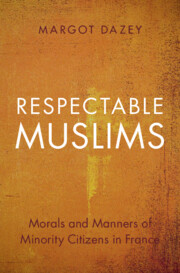Book contents
- Respectable Muslims
- Cambridge Studies in Social Theory, Religion, and Politics
- Respectable Muslims
- Copyright page
- Contents
- Acknowledgments
- Note on Transliterations and Translations
- 1 The (Un)Making of Respectability
- 2 Proving Frenchness
- 3 Allaying Suspicions
- 4 Keeping Order
- 5 Practicing Discreetly
- 6 Uplifting the Community
- 7 Facing Hostility Graciously
- 8 Respectable Citizens in Uncertain Environments
- Bibliography
- Index
4 - Keeping Order
Responsible Muslims against Urban Unrest
Published online by Cambridge University Press: 18 December 2024
- Respectable Muslims
- Cambridge Studies in Social Theory, Religion, and Politics
- Respectable Muslims
- Copyright page
- Contents
- Acknowledgments
- Note on Transliterations and Translations
- 1 The (Un)Making of Respectability
- 2 Proving Frenchness
- 3 Allaying Suspicions
- 4 Keeping Order
- 5 Practicing Discreetly
- 6 Uplifting the Community
- 7 Facing Hostility Graciously
- 8 Respectable Citizens in Uncertain Environments
- Bibliography
- Index
Summary
Community leaders attempt to deflect the stigma of the “angry” and “disorderly” Muslim by participating in local politics. In the wake of urban unrest affecting disadvantaged neighborhoods in France, Muslim leaders of the UOIF have leveraged their community influence to facilitate the integration of migrant-origin populations and keep these neighborhoods quiet. This chapter sheds light on their politics during episodes of social turmoil, such as the 2001 unrest in Lille and the 2005 riots throughout France. Beyond times of crisis, their role as social troubleshooters is reflected in the dissemination of an ethos of responsibility. Through various activities, including charitable assistance, professional insertion, and campaigns against drugs, these Muslim leaders partially converge with public authorities about the need to preserve order in “sensitive neighborhoods.” In ways reminiscent of Black middle-class reformers in the early twentieth-century US, UOIF leaders promote the uplift ideology that values self-reliance, discipline, and hard work. They seek to transform young urban worshippers into moral subjects, committed to avoiding the dishonorable pitfalls of idleness and incivility. However, positioning themselves as social troubleshooters is costly as these leaders unwittingly reproduce the dominant representations of migrants’ neighborhoods as problematic and, consequently, tend to divert attention from the structural causes of marginalization.
Keywords
- Type
- Chapter
- Information
- Respectable MuslimsMorals and Manners of Minority Citizens in France, pp. 94 - 115Publisher: Cambridge University PressPrint publication year: 2024

